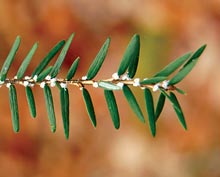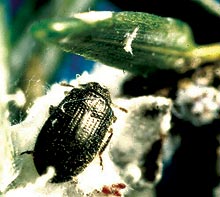Members of Tsuga, the hemlock genus, are found in portions of Asia, the Pacific Northwest and the Eastern U.S. Through much of these species’ ranges, they’ve been afflicted—for who knows how long—by an insect known as the hemlock woolly adelgid (Adelges tsugae). But in each instance, groups of predatory beetles hold the pest in check.

This is the case in the Pacific Northwest, where the native Western hemlock has always been preyed upon by a native adelgid population. And that population, in turn, has always had a nemesis, the fall/winter-active beetle Laricobius nigrinus.
The hemlock woolly adelgid is believed to have touched down in the Eastern United States at a nursery in Richmond, Va., in the first half of the 20th century, riding in on an imported Japanese variety of weeping hemlock. Having no natural predators here, the insect spread like wildfire. Hemlock losses have occurred at an alarming rate in Western North Carolina, especially during the past five years.
A control for the adelgid is available in the form of an insecticide, Imidacloprid, which is known in the United States under the trade name Merit. The insecticide has been holding the pest at bay on some specimen hemlocks (individual trees that are considered more valuable due to great age or superior aesthetics). Landowners with enough money can have the ground around individual trees treated with Merit in order to halt infestations.
But while the insecticide is buying time for many trees, it’s not a cure. Merit applications are too expensive to be used on understory hemlocks in close proximity to valued trees, and after about three years, trees need to be treated again.

Moreover, there are concerns about Imidacloprid’s environmental impacts. Besides killing its target pests, there is evidence that the insecticide—used worldwide in 120 countries during the last 20 years—also causes lethal damage to other insect and freshwater crustacean populations. A brand of Imidacloprid with the trade name Gaucho was banned in France for several years amid concerns about its role in the collapse of honeybee colonies. There have been other troubling reports concerning Imidacloprid’s effects worldwide.
In 1992, a federal biologist studying the problem of the Eastern hemlock’s demise concluded that the Western hemlocks in the Pacific Northwest are naturally resistant to the tiny insect, because its population is kept in check by predatory insects. It took U.S. Forest Service entomologists, along with researchers at Virginia Tech and entomologist Richard McDonald of Boone, to point out that Western hemlocks growing in WNC are just as susceptible to the adelgid as our native trees. And, says McDonald, there are examples of Eastern and Carolina hemlocks, of various ages, living in the Pacific Northwest and seemingly unaffected by the same adelgid infestations that are found on their West Coast cousins growing close by.
With that in mind, the predatory beetle Laricobius nigrinus was first imported to Virginia Tech in 1997 and was approved for release in 2000. But setting up a sustained biological system in an infected area that encompasses roughly 10 percent of the continental United States is an enormous task. It was at this point that Merit was introduced for the purpose of stopping hemlock woolly adelgid infestations—at least temporarily—on valued trees.
McDonald owns the Boone-based Symbiont Biological Pest Management, which sells beneficial insects. A former state apiarist and biological-control administrator with the N.C. Department of Agriculture and Consumer Services, he’s been capturing and importing L. nigrinus from the Pacific Northwest and another adelgid foe, Sasajiscymnus tsugae (originally from Asia) and making controlled releases in three heavily infested hemlock groves near Boone. His goal is to understand what it will take to keep adelgid infestations under control using these beneficial predators.
To date, McDonald says he’s captured nearly 10,000 of these beneficial predators for use in lab rearing and release in WNC. “We want to target specific watersheds to get strategic locations established with L. nigrinus, so they can spread outward from release points,” McDonald explains.
Three years after initially releasing several hundred predatory beetles at his Boone monitoring sites, McDonald has found that a fourth generation of the insects is reproducing and moving outward at a rate of roughly a quarter-mile per year—and having a marked impact on adelgid populations. But as he says, “It is a numbers game. Quantities enough to seed the region for a sustainable result will require funding and awareness that we don’t have right now.”
The mere fact that Eastern, Carolina and Western hemlocks have been growing in the Pacific Northwest for decades without chemical treatment, however, may point to a solution that’s increasingly at home in our own back yard.
[Jeff Ashton lives and gardens in Weaverville.]


Before you comment
The comments section is here to provide a platform for civil dialogue on the issues we face together as a local community. Xpress is committed to offering this platform for all voices, but when the tone of the discussion gets nasty or strays off topic, we believe many people choose not to participate. Xpress editors are determined to moderate comments to ensure a constructive interchange is maintained. All comments judged not to be in keeping with the spirit of civil discourse will be removed and repeat violators will be banned. See here for our terms of service. Thank you for being part of this effort to promote respectful discussion.